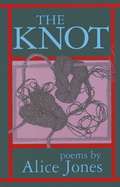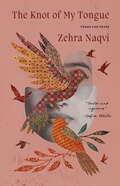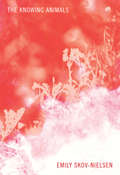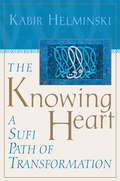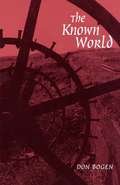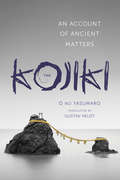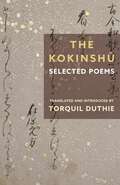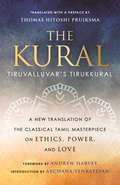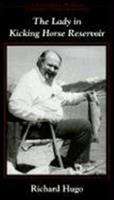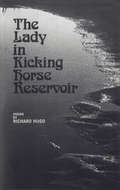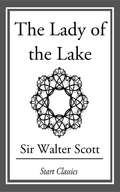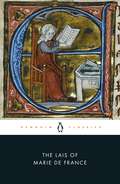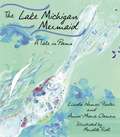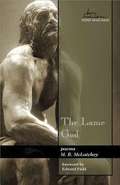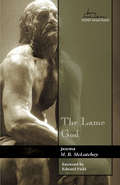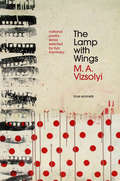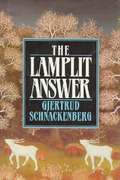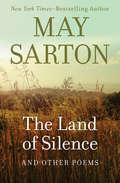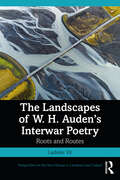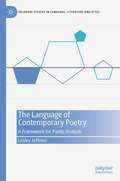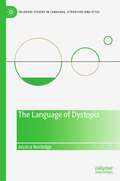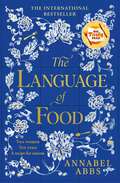- Table View
- List View
The Knock at Midnight
by Gurbhagat Singh Puran SinghOriginal modern Punjabi Poet Puran Singh (1881-1931) wrote poems in Punjabi and were translated in English by Gurbhagat Singh. Author also goes by the name "Purana Singha".
The Knot
by Alice JonesThe Knot is an extraordinary combination of lyricism, mythmaking, and an informed use of the language of medicine in poetry.
The Knot of My Tongue: Poems and Prose
by Zehra NaqviFor readers of Fatimah Asghar&’s If They Come for Us, here is a searing, multidimensional debut about the search for language and self, which is life itself.I knew it was time to build what could carry, what could find the high point to name what I knew to be the world and carry it with meAt the heart of The Knot of My Tongue is Zehra Naqvi&’s storying of language itself and the self-re-visioning that follows devastating personal rupture. Employing a variety of poetic forms, these intimate, searching poems address generations, continents, and dominions to examine loss of expression in the aftermath of collisions with powerful forces, ranging from histories to intimacies. Naqvi follows a cast of characters from personal memory, family history, and Quranic traditions, at instances where they have either been rendered silent or found ways to attempt the inexpressible—a father struggling to speak as an immigrant in Canada; a grandmother as she loses her children and her home after the 1947 Partition; the Islamic story of Hajar, abandoned in the desert without water; the myth of Philomela who finds language even after her husband cuts off her tongue. Brilliantly blending the personal and the communal, memory and myth, theology and tradition, the poems in this collection train our attention—slow and immediate, public and private—on our primal ability to communicate, recover, and survive. This example is striking for the power of its speaking through loss and a singular, radiant vision.
The Knowing Animals
by Emily Skov-NielsenPoems that sing, in various notes of female voice, the human being as an embodied, contemplative, feeling animal. In Skov-Nielsen's thrumming debut, The Knowing Animals, our consciousness is interconnected with the surrounding trees, bugs, rivers, atmospheres, and cosmos. Here, flowers escape Victorian domestication and ally with girls' green powers of attraction. Here, the social politeness of motherly domesticity and the raw dangers of adolescent sexual awakening are shot through with blood pulsing under the skin, with oxygen exchanged in gasps of breath. Here, everything tender and petalling is also raw and mothervisceral. This is a book of entanglements: the poems twist and turn through a plurality of metaphorical associations involving botany, zoology, astronomy, biology, psychology, and mythology to complicate and expand human conceptions of nature. At the same time, they explore themes such as motherhood, pregnancy and birth, sexuality, adolescence, and the rise of technology, all the while shifting through a variety of tones: romantic, mythological, religious, scientific, wistful, and playful.
The Knowing Heart: A Sufi Path of Transformation
by Kabir HelminskiAs human beings we stand on the threshold between two realities: the world of material existence and the world of spiritual Being. The "knowing heart" is the sacred place where these two dimensions meet and are integrated. In Sufi teaching the human heart is not a fanciful metaphor but an objective organ of intuition and perception. It is able to perceive all that is beautiful, lovely, and meaningful in life--and to reflect these spiritual qualities in the world, for the benefit of others. Every human heart has the capacity and the destiny to bring that world of divine reality into this world of appearances. The Sufis, mystics of Islam, have been educators of the heart for some fourteen centuries. Their teachings and methods are designed to help us awaken and purify the heart, to learn to listen to our deepest knowing. In The Knowing Heart, Kabir Helminski presents the Sufi way as a practical spirituality suitable for all cultures and times--and offers insights that are especially valuable for our life in today's world. In cultivating a knowing heart, we learn to experience a new sense of self, transform our relationships, and enhance our creative capacities. Most important, we learn how to meet the spiritual challenge of our time: to realize our sacred humanness.
The Known World (Wesleyan Poetry Series)
by Don BogenTurning bare description into a luxuriance, The Known World looks at the complex relationship of past and present, creating energetic juxtaposition between different historic periods to envision life at the end of our own century. Don Bogen calls the work an archeology, and uses details f life in past eras as a way of penetrating the surfaces of history. In his account, everything known is both encumbered with and defined by the past. Short poems in this collection cohere around the long title poem, which explores the nineteenth century through more than thirty sections in different voices and styles, including lists, mock letters, brief narratives, and lyric passages. The result is lively and illuminating.
The Kojiki
by Gustav HeldtChronicles the mythical origins of Japan's islands and their ruling dynasty through a diverse array of genealogies, tales, and songs
The Kojiki: An Account of Ancient Matters (Translations from the Asian Classics)
by No Yasumaro ŌJapan's oldest surviving narrative, the eighth-century Kojiki, chronicles the mythical origins of its islands and their ruling dynasty through a diverse array of genealogies, tales, and songs that have helped to shape the modern nation's views of its ancient past. Gustav Heldt's engaging new translation of this revered classic aims to make the Kojiki accessible to contemporary readers while staying true to the distinctively dramatic and evocative appeal of the original's language. It conveys the rhythms that structure the Kojiki's animated style of storytelling and translates the names of its many people and places to clarify their significance within the narrative. An introduction, glossaries, maps, and bibliographies offer a wealth of additional information about Japan's earliest extant record of its history, literature, and religion.
The Kokinshū: Selected Poems (Translations from the Asian Classics)
by Torquil DuthieCompiled in the early tenth century, the Kokinshū is an anthology of some eleven hundred poems that aimed to elevate the prestige of vernacular Japanese poetry at the imperial court. From shortly after its completion to the end of the nineteenth century, it was celebrated as the cornerstone of the Japanese vernacular poetic tradition. The composition of classical poetry, other later poetic forms such as linked verse and haikai, and vernacular Japanese literary writing in its entirety (including classic works such as Murasaki Shikibu’s Tale of Genji and Sei Shōnagon’s Pillow Book) all draw from the Kokinshū.This book offers an inviting and immersive selection of roughly one-third of the anthology in English translation. Torquil Duthie focuses on rendering the poetic language of the Kokinshū as a whole, in such a way that readers can understand and experience how its poems work together to create a literary world. He emphasizes that classical Japanese poems do not stand alone as self-contained artifacts but take part in an ongoing intertextual conversation. Duthie provides translations and interpretations of the two prefaces to the Kokinshū, which deeply influenced Japanese literary aesthetics. The book also includes critical essays on various aspects of the anthology and its history. This translation helps specialist and nonspecialist readers alike appreciate the beauty and richness of the Kokinshū, as well as its significance for the Japanese literary tradition.
The Kural: Tiruvalluvar's Tirukkural
by Thomas Hitoshi PruiksmaA new translation of the classical Tamil masterpiece on ethics, power, and friendship, bringing Tiruvalluvar&’s poetry and philosophy to a new generation seeking practical wisdom and spiritual sustenanceDrawing on the poetic tradition of W. S. Merwin, Wendell Berry, and William Carlos Williams, and nurtured by 2 decades of study under Tamil scholar Dr. K. V. Ramakoti, this new translation of the Kural by Thomas Hitoshi Pruiksma brings English readers closer than ever to the brilliant inner and outer music of Tiruvalluvar&’s work and ideas.Tiruvalluvar&’s Tirukkural is a masterwork of poetry and practical philosophy. On par with other world classics such as the Tao Te Ching, the Kural is a compendium of 1,330 short philosophical verses, or kurals, that together cover a wide range of personal and cosmic experience, such as—POLITICS:Harsh rule that brings idiots together—nothingBurdens the earth moreHOSPITALITY:The life that cherishes strangers each dayNever falls upon ruinFRIENDSHIP:Friendship is not a face smiling—friendshipIs a heart that smilesGREED:Those who won&’t give and enjoy—even with billionsThey have nothingAccompanying the translation is a foreword by the founder of the Institute for Sacred Activism, Andrew Harvey; an introduction by the translator and scholar Archana Venkatesan; and a &“Commentary of Notes,&” in which Pruiksma elucidates key words and shares insights from important Tamil commentaries.Rich with indelible wordplay, learning, and heart, Pruiksma&’s translation transforms the barrier of language into a bridge, bringing the fullness of Tiruvalluvar&’s poetic intensity to a new generation.
The Lady in Kicking Horse Reservoir
by Richard HugoThe collection includes "Montgomery Hollow," the title poem, and the famous, "Degrees of Gray in Philipsburg," in which he turns to the reader, midway through his description of a dying town, and says, "Isn't this your life? That ancient kiss/ still burning out your eyes? Isn't this defeat/ so accurate, the church bell simply seems/ a pure announcement: ring and no one comes?" His 1973 book, The Lady in Kicking Horse Reservoir, is both about Montana and not about Montana. Of his method, Hugo once said: "Usually I find a poem is triggered by something, a small town or abandoned house, that I feel others would ignore." The poems in The Lady in Kicking House Reservoir are tied to place and landscape, but Hugo's real subject matter remains elusive. From the book jacket: Richard Hugo (1923-1982) was born and raised in White Center, Washington. He flew thirty-three missions in Europe as a bombardier in World War II, receiving the Distinguished Flying Cross. He returned to Seattle to study with Theodore Roethke at the Writing Program. Nominated for the National Book Award. From 1977 to the end of his life, Hugo served as the judge of the Yale Series of Younger Poets competition. Upon publication of The Lady in Kicking Horse Reservoir in 1973, Richard Howard wrote, "Richard Hugo's concern is the unenviable, the unvisited, even the uninviting, which he must invest with his own deprivation, his own private war.... Each poem adds its incisive particulars to the general stoic wreck; but what startles, then reassures in all this canon of the inconsolable, the unsanctified, the dispossessed, is Hugo's poetics, the analogy of language to experience. . . . Richard Hugo is such an important poet because the difficulties inherent in his art provide him a means of saying what he has to say. It is no accident that he must develop a negative in order to produce a true image."
The Lady in Kicking Horse Reservoir: Poems
by Richard Hugo"Richard Hugo's concern is the unenviable, the unvisited, even the uninviting, which he must invest with his own deprivations, his own private war. The distinctiveness of impulse int he language, the movement organized in single syllables by the craving mind, this credible richness is related to, is even derived from, the poverty of the places, local emanations, free (or freed) to be the poet's own." --Richard Howard "Richard Hugo is such an important poet because the difficulties inherent in his art provide him a means of saying what he has to say. It is no accident that he must develop a negative in order to produce a true image." --Richard Howard
The Lady of the Lake
by Sir Walter Scott"The Lady of the Lake is a narrative poem by Sir Walter Scott, first published in 1810. Set in the Trossachs region of Scotland, it comprises six cantos, each of which concerns the action of a single day. The poem has three main plots: the contest among three men, Roderick Dhu, James Fitz-James, and Malcolm Graeme, to win the love of Ellen Douglas; the feud and reconciliation of King James V of Scotland and James Douglas; and a war between the lowland Scots (led by James V) and the highland clans (led by Roderick Dhu of Clan Alpine). The poem was tremendously influential in the nineteenth century, and did much to inspire the Highland Revival. By the late twentieth century, however, the poem was virtually forgotten. Its influence is thus indirect: Schubert's Ave Maria, Rossini's La donna del lago (1819), the racist custom of cross burning, the last name of U.S. abolitionist Frederick Douglass, and the song "Hail to the Chief" were all inspired by the poem.
The Lady of the Lake
by Walter ScottThe Lady of the Lake is a narrative poem by Sir Walter Scott, first published in 1810. Set in the Trossachs region of Scotland, it is composed of six cantos, each of which concerns the action of a single day. The poem has three main plots: the contest among three men, Roderick Dhu, James Fitz-James, and Malcolm Graeme, to win the love of Ellen Douglas; the feud and reconciliation of King James V of Scotland and James Douglas; and a war between the lowland Scots (led by James V) and the highland clans (led by Roderick Dhu of Clan Alpine). The poem was tremendously influential in the nineteenth century, and inspired the Highland Revival.
The Lais of Marie De France: With Two Further Lais in the Original Old French
by Marie FranceMarie de France (fl. late twelfth century) is the earliest known French woman poet and her lais - stories in verse based on Breton tales of chivalry and romance - are among the finest of the genre. Recounting the trials and tribulations of lovers, the lais inhabit a powerfully realized world where very real human protagonists act out their lives against fairy-tale elements of magical beings, potions and beasts. De France takes a subtle and complex view of courtly love, whether telling the story of the knight who betrays his fairy mistress or describing the noblewoman who embroiders her sad tale on the shroud for a nightingale killed by a jealous and suspicious husband.
The Lake Michigan Mermaid: A Tale in Poems (Made in Michigan Writers Series)
by Anne-Marie Oomen Linda Nemec FosterThe Lake Michigan Mermaid is a new tale that feels familiar. The breeze off the lake, the sand underfoot, the supreme sadness of being young and not in control—these sensations come rushing back page by page, bringing to life an ancient myth of coming of age in a troubled world. Freed from the minds of Linda Nemec Foster and Anne-Marie Oomen, the Lake Michigan mermaid serves as a voice of reason for when we’re caught in the riptide. This is a gripping tale in poems of a young girl’s desperate search for guidance in a world turned upside down by family and economic upheaval. Raised in a ramshackle cottage on the shores of Lake Michigan, Lykretia takes refuge in her beloved lake in the face of her grandmother’s illness and her mother’s eager attempts to sell their home following her recent divorce. One day Lykretia spots a creature in the water, something beautiful and inexplicable. Is it the mythical Lake Michigan mermaid, or an embodiment of the stories her grandmother told as dementia ravaged her mind? Thus begins a telepathic conversation between a lost young girl and Phyliadellacia, the mermaid who saves her in more ways than one. Accompanied by haunting illustrations, The Lake Michigan Mermaid offers a tender tale of friendship, redemption, and the life-giving power of water. As it explores family relationships and generational bonds, this book is an unforgettable experience that aims to connect readers of all ages.
The Lame God
by M. B. MclatcheyIn The Lame God, author M. B. McLatchey reminds us of the inevitable bond between art and empathy. With a controlled language that finds its echo chamber in the immortal themes and characters of classical literature, this courageous work accompanies the author on her journey through a parent's anguish in the face of a horrific crime. Using the art of poetry she gives voice to a suffering--and a love--that might otherwise go unheard.The May Swenson Poetry Award, an annual competition named for May Swenson, honors her as one of America's most provocative and vital writers. During her long career, Swenson was loved and praised by writers from virtually every school of American poetry. She left a legacy of fifty years of writing when she died in 1989. She is buried in Logan, Utah, her hometown.
The Lame God (Swenson Poetry Award #16)
by M. B. McLatcheyWinner of 2013 May Swenson Poetry AwardIn The Lame God, author M. B. McLatchey reminds us of the inevitable bond between art and empathy. With a controlled language that finds its echo chamber in the immortal themes and characters of classical literature, this courageous work accompanies the author on her journey through a parent’s anguish in the face of a horrific crime. Using the art of poetry she gives voice to a suffering—and a love—that might otherwise go unheard. The May Swenson Poetry Award, an annual competition named for May Swenson, honors her as one of America's most provocative and vital writers. During her long career, Swenson was loved and praised by writers from virtually every school of American poetry. She left a legacy of fifty years of writing when she died in 1989. She is buried in Logan, Utah, her hometown.
The Lamp with Wings
by M. A. VizsolyiA winner of the 2010 National Poetry Series Prize as selected by Ilya Kaminsky (author of Dancing in Odessa, recipient of the 2004 Whiting Award, the Ruth Lilly Fellowship, among other honors, and co-editor of The Ecco Anthology of International Poetry), Vizsolyi's work perpetuates NPS's tradition of promoting exceptional poetry from emerging poets. Kaminksy writes that Vizsolyi's poetry "is erotic the way Catullus was erotic, and Mayakovsky. The voice is arrogant and tender, it goes 'on the nerve,' as Frank O'Hara told us the poet must. This book with knock your socks off. This is real poetry." For thirty years, the National Poetry Series has discovered many new voices and has been instrumental in launching the careers of poets and writers such as Billy Collins, Mark Doty, Denis Johnson, Cole Swensen, Thylias Moss, Mark Levine, and Dionisio Martinez.
The Lamplit Answer
by Gjertrud SchnackenbergThis selection of poetry is the author’s second collection. It diverges from the tone and traditional forms of her first collection with the introduction of several works of light verse, and a lengthy poem about Chopin’s first year in Paris (Kremlin of Smoke) written mostly in free verse. Yet, the rhyme and cadenced poems, still largely concerned with the summoning of significant past lives and events--historic or personal--dominate the book, giving it Schnackenberg’s distinctive signature.
The Land of Silence: And Other Poems
by May SartonA splendid collection from a true master It is often in solitude that a writer begins to understand herself. This becomes evident in The Land of Silence, May Sarton&’s collection of poems previously published in the New Yorker and Harper&’s Magazine, as Sarton searches for solitude and tries to understand the regrets and ecstasies associated with it. Images from these poems linger in the mind&’s eye: a bird, a dream. Sarton&’s verse feels real, yet it represents something more. Published in 1953, the year after Sarton won the Reynolds Lyric Award of the Poetry Society of America, The Land of Silence presents a poet at peak form.
The Landscapes of W. H. Auden’s Interwar Poetry: Roots and Routes (Perspectives on the Non-Human in Literature and Culture)
by Ladislav VítThis is the first book-length study foregrounding Auden’s sense of place as a means for enhancing our grasp of this crucial twentieth-century poet. Proposing that Auden had a remarkable spatial sensibility, this book concentrates on his treatment of his homeland England, as well as the North Pennines and Iceland, both of which served as his ‘good’ places, ‘holy’ grounds and sources of topophilic sentiment. The readings draw on the scholarship of humanistic geography, tracing patterns of mental constructs which emerge from spatial experience. In a scholarly but engaging way, this book argues that focusing on Auden’s poetics of place as it emerged and evolved can be instrumental to our understanding of this influential poet not only in relation to his epoch but also to the Anglophone poetic tradition. Precisely because of his stature, these elaborations on Auden’s preoccupation with places, escapism, borders and local identity promise to enrich our understanding of the cultural and intellectual climate of the interwar period, when established notions of local places and cultures were beginning to be contested by internationalisation. This study will be of interest to both academics and students in the field of Anglophone literary studies while also appealing to those attracted to Auden’s poetry, interwar culture and the literary representation of space.
The Language of Contemporary Poetry: A Framework for Poetic Analysis (Palgrave Studies in Language, Literature and Style)
by Lesley JeffriesThis book introduces a new way of looking at how poems mean, drawing on the framework first developed in the author’s book Critical Stylistics, but applied here to aesthetic more than ideological meaning. The aim is to empower readers of poetry to articulate the features of poetic language that they come across and explain to themselves and others why these features convey the meanings that they do. While this volume focuses on contemporary poets writing in English and mostly based in the UK and Ireland, the framework will work just as well for other eras’ poetry, as well as for other cultures and languages.
The Language of Dystopia (Palgrave Studies in Language, Literature and Style)
by Jessica NorledgeThis book presents an extended account of the language of dystopia, exploring the creativity and style of dystopian narratives and mapping the development of the genre from its early origins through to contemporary practice. Drawing upon stylistic, cognitive-poetic and narratological approaches, the work proposes a stylistic profile of dystopia, arguing for a reader-led discussion of genre that takes into account reader subjectivity and personal conceptualisations of prototypicality. In examining and identifying those aspects of language that characterise dystopian narratives and the experience of reading dystopian fictions, the work discusses in particular the manipulation and construction of dystopian languages, the conceptualisation of dystopian worlds, the reading of dystopian minds, the projection of dystopian ethics, the unreliability of dystopian refraction, and the evolution and hybridity of the dystopian genre.
The Language of Food: "Mouth-watering and sensuous, a real feast for the imagination" BRIDGET COLLINS
by Annabel Abbs'A sensual feast of a novel, written with elegance, beauty, charm and skill in a voice that is both lyrical and unique' Santa Montefiore Eliza Acton, despite having never before boiled an egg, became one of the world&’s most successful cookery writers, revolutionizing cooking and cookbooks around the world. Her story is fascinating, uplifting and truly inspiring.Told in alternate voices by the award-winning author of The Joyce Girl, and with recipes that leap to life from the page, The Language of Food by Annabel Abbs is the most thought-provoking and page-turning historical novel you&’ll read this year, exploring the enduring struggle for female freedom, the power of female friendship, the creativity and quiet joy of cooking and the poetry of food, all while bringing Eliza Action out of the archives and back into the public eye. &‘I love Abbs&’s writing and the extraordinary, hidden stories she unearths. Eliza Acton is her best discovery yet&’ Clare Pooley'A literary - and culinary - triumph!' Hazel Gaynor &‘Exhilarating to read - thoughtful, heart-warming and poignant, with a quiet intelligence and elegance that does its heroine proud&’ Bridget Collins 'A sumptuous banquet of a book that nourished me and satisfied me just as Eliza Acton&’s meals would have... I adored it' Polly Crosby &‘Wonderful... Abbs is such a good story teller. She catches period atmosphere and character so well&’ Vanessa Nicolson 'Two of my favourite topics in one elegantly written novel - women&’s lives and food history. I absolutely loved it' Polly Russell 'A story of courage, unlikely friendship and an exceptional character, told in vibrant and immersive prose' Caroline Scott &‘Richly imagined and emotionally tender&’ Pen Vogler 'Characters that leap off the page, a fascinating story and so much atmosphere, you feel you're in the kitchen with Eliza - I loved it.' Frances Quinn 'Clever, unsentimental, beautifully detailed and quietly riveting' Elizabeth Buchan, author of Two Women in Rome

